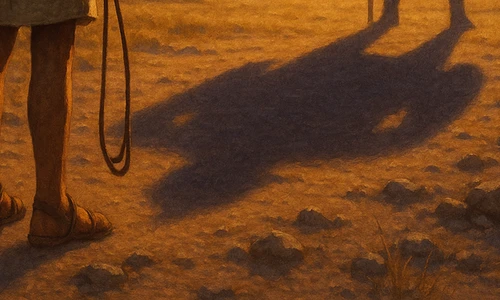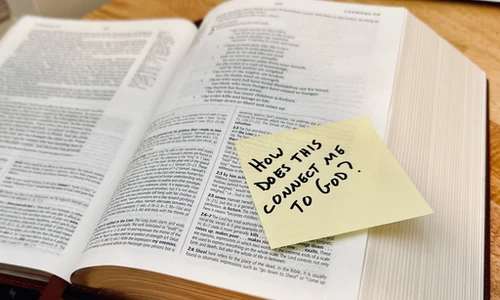TL;DR: Moses made five objections to God’s call at the burning bush (Exodus 3–4): “Who am I?” “Who are You?” “They won’t believe me,” “I’m not good at this,” and “Please send someone else.” Each one reflects a fear we share—but God answered every one with grace, presence, and power.
Moses is one of the most relatable of the fathers of Israel—he’s kind of out of place; he gets frustrated; he fights with his brother and sister; he gets tired; he works himself too hard until his father-in-law makes a common-sense suggestion to lighten the load; he argues with the Creator of the Universe.
You’ve never argued with God? I have.

Put yourself in Moses’s shoes. You’re a Hebrew child raised by an Egyptian princess—so you don’t belong anywhere. One day, you try to defend your Hebrew kinsman and you end up killing an Egyptian; the next day, the Hebrews reject you for trying to help. So you go into exile. You find a nice woman to marry and you have kids. One day, you’re minding your own business, when a burning bush talks to you and tells you to go back to Egypt, the place where both your native culture and your adopted culture hate you.
You might argue, too.
Moses delivers not one but five objections there on the mountain, speaking with God barefoot by the bush. God answers them all, but in the conversation we see Moses’s deeply human fear, doubt, and reluctance.
That makes this passage not just another calling of a prophet story, but our story.
Objection 1: “Who Am I?” — When You Feel Unworthy of God’s CallPermalink
11 But Moses said to God, “Who am I that I should go to Pharaoh and bring the children of Israel out of Egypt?”
Moses begins by questioning his own identity—reasonable for someone whose identity has caused him problems literally since before he was born. Many people in Scripture find themselves out of place, but maybe none more so than Moses. His skin makes him one thing—a Hebrew born under threat of death to all Hebrew babies; his upbringing makes him another—immediately misplaced into the court of Pharaoh. He’s grown up not belonging to either culture, and his attempt to fit in—killing the Egyptian—only made it worse on both sides. How can a nobody stand before Pharaoh? How can an outsider lead Israel to freedom? How can a mere man defeat a great empire?
12 He said, “But I will be with you, and this shall be the sign for you, that I have sent you: when you have brought the people out of Egypt, you shall serve God on this mountain.”
God doesn’t answer Moses’s objection; He rejects the premise. His response is, effectively, “It doesn’t matter who you are; it matters who I am, and I will be with you.”
But God goes further. He doesn’t just assert His support; He gives Moses a sign. This is God’s way: He makes promises of “small” things to give us faith for the “bigger” things. (In this case, the “small” thing is the salvation of the entire nation of Israel from oppression in Egypt. What could possibly be bigger than that? Leading them into the Promised Land. Jesus, later, doesn’t just save us from sin and death; He welcomes us into His home for all eternity.)
Here’s the weird part: Moses actually has the perfect identity to “go to Pharaoh and bring the children of Israel out of Egypt.” He was raised in the Egyptian court, so he knows better than almost anybody in Egypt how the politics work, what the rituals are, how to properly behave in that setting before this god-king. And he is, despite his fear, a child of Israel, so he has authority to lead them—Israel would never, could never, let a foreigner lead them anywhere.
But God doesn’t give these perfectly reasonable, easily articulated answers. He gives a far better answer: “It doesn’t matter who you are; it matters who I AM.”
Connection: What part of your identity are you letting hold you back from full service to God?
Objection 2: “Who Are You?” — Trusting the God Behind the MissionPermalink
Of course, that’s Moses’s next question.
13 Then Moses said to God, “If I come to the people of Israel and say to them, ‘The God of your fathers has sent me to you,’ and they ask me, ‘What is his name?’ what shall I say to them?”
Moses has a problem: who among the Israelites remembers the god of Abraham and Isaac and Jacob? They’ve been in Egypt for 430 years, long enough for Pharaoh to forget Joseph, and long enough for them to forget the god of their fathers. They’ve been surrounded by believers in the Egyptian pantheon for centuries, and now Moses has to go remind them of… what’s his name?
God once again does not answer Moses’s question.
14 God said to Moses, “I am who I am.” And he said, “Say this to the people of Israel: ‘I am has sent me to you.’” 15 God also said to Moses, “Say this to the people of Israel: ‘The LORD, the God of your fathers, the God of Abraham, the God of Isaac, and the God of Jacob, has sent me to you.’ This is my name forever, and thus I am to be remembered throughout all generations.
Other gods have names like “Amun-Ra” and “Zeus”; this one gives not a name but a description: the self-existent one, who depends on nothing else, whose existence is absolute and unchanging. He is, therefore, a God before all gods; and more, the only God, the source of being itself.
On one hand, this answer doesn’t directly respond to Moses’s question—he asked for a name, and God gave him a phrase. On the other hand, it is better than he could have imagined: the one who sends him is the real God, not like these idols the Egyptians worship or the half-remembered shadows the Israelites have of their fathers’ god. It at once recalls the identify of the Hebrew nation (children of Jacob) and promises the ultimate defeat of Egypt—this God is unimaginably greater than the gods of Egypt, which include Pharaoh, so if this God is behind Moses, he will surely defeat Pharaoh and his armies1.
This is the passage, by the way, where we get the name Yahweh for God: the Hebrew verb ehyeh, “I am,” becomes YHWH, the name Israel will come to know as Yahweh, also sometimes spelled Jehovah.
God, in answering Moses’s question, has created from scattered slaves a blessed nation. Seems kind of unbelievable, doesn’t it?
Connection: When have you worried what to say to someone about Jesus?
Objection 3: “They Won’t Believe Me” — When You Doubt Your WitnessPermalink
Which is Moses’s third objection.
1 Then Moses answered, “But behold, they will not believe me or listen to my voice, for they will say, ‘The LORD did not appear to you.’”
This is too much! This exile is just going to come out of nowhere, backed by the God of gods, and set the Hebrews free? Is he nuts?
God, to my great joy, totally agrees with Moses. He says, in essence, “Yeah, you’re right, they won’t believe you. But they’ll believe me! Does miracles”
God has Moses perform a few miracles, which has two effects: first, just in case Moses still doubted who he was talking to, here was proof there was power at work. And second, this kind of power would be the “show” counterpart to the “tell” God had just commanded from Moses.
First, his staff becomes a snake:
3 And he said, “Throw it on the ground.” So he threw it on the ground, and it became a serpent, and Moses ran from it. 4 But the LORD said to Moses, “Put out your hand and catch it by the tail”–so he put out his hand and caught it, and it became a staff in his hand– 5 “that they may believe that the LORD, the God of their fathers, the God of Abraham, the God of Isaac, and the God of Jacob, has appeared to you.”
Then, his hand becomes leprous and is healed:
6 Again, the LORD said to him, “Put your hand inside your cloak.” And he put his hand inside his cloak, and when he took it out, behold, his hand was leprous like snow. 7 Then God said, “Put your hand back inside your cloak.” So he put his hand back inside his cloak, and when he took it out, behold, it was restored like the rest of his flesh.
God has demonstrated His absolute control over nature and people—what more could Moses ask for?
Here’s the takeaway for us from this exchange: God hears us. He could easily have said to Moses, “Go anyway!” But he doesn’t. He understands Moses’s concern and doubt, and He helps Moses’s faith. (He also sets him up for ever-greater miracles that climax in the killing of every firstborn of Egypt, but that’s another story.)
Meanwhile, Moses comes up with another objection.
Connection: Do you ever worry people won’t believe you when you tell them about your experiences of God? About your faith?
Objection 4: “I’m Not Good At This” — Feeling Inadequate to Speak for GodPermalink
Having exhausted his objections about his identity, authority, and credibility, Moses moves on to ability:
10 But Moses said to the LORD, “Oh, my Lord, I am not eloquent, either in the past or since you have spoken to your servant, but I am slow of speech and of tongue.”
Ironically, Moses is pretty quick at coming up with excuses… anyway, this “slow of speech and slow of tongue” could be a speech impediment that would cause him problems before Pharaoh, or it could be that he simply feels inadequate to confronting Pharaoh and his magicians and astrologers and the wise men of the court. Despite growing up in the court, how could he hope to hold his own in a verbal sparring match with such educated men?
Moses has apparently forgotten that a) God just performed miracles and promised more, so it’s not just verbal; b) God promised to be with him, so he’s backed by the greatest power—the only power—in the universe; and c) God showed He has power over Moses’s hand, so why not his tongue?
(Moses is not the only prophet with this complaint, by the way; Isaiah says, “Woe to me, for I am a man of unclean lips!”)
God, ever patient, reminds Moses that He will be with him:
11 Then the LORD said to him, “Who has made man’s mouth? Who makes him mute, or deaf, or seeing, or blind? Is it not I, the LORD? 12 Now therefore go, and I will be with your mouth and teach you what you shall speak.”
Interestingly, God again does not simply assert His authority, as He has every right to do. Instead, He reminds Moses of who He is: the creator. Many authors in Scripture refer back to the creation to make their argument; in this case, God reminds Moses that He created the mouth, and just as He can dull a sense (mute, deaf, blind), surely He can open Moses’s mouth.
Notice God never says, “Yes you are, Moses—you’re strong!” He only says, “It doesn’t matter, Moses. I’m strong.”
Moses, poor Moses, once more opens his mouth.
Connection: Think of abilities you’re strong with; do you base your testimony on those? What weaknesses do you believe you have that God might be calling you to serve in spite of or even because of?
Objection 5: “Please Send Someone Else” — When You Just Don’t Want to GoPermalink
“I don’t wanna!” is Moses’s fifth and final objection.
13 But he said, “Oh, my Lord, please send someone else.”
Up until now, I’ve understood Moses’s challenges, I’ve identified with his objections, and I’ve worked to see them in my own life. > But here, Moses simply takes the words out of my mouth: “I don’t want to. Please send someone else. Someone else to give. Someone else to serve. Someone else to pick up that trash. Someone else to hug that person, to feed the hungry, to clothe the naked, to heal the sick.”
Moses, I see you.
God sees him too, and finally gets angry.
14 Then the anger of the LORD was kindled against Moses and he said, “Is there not Aaron, your brother, the Levite? I know that he can speak well. Behold, he is coming out to meet you, and when he sees you, he will be glad in his heart. 15 You shall speak to him and put the words in his mouth, and I will be with your mouth and with his mouth and will teach you both what to do. 16 He shall speak for you to the people, and he shall be your mouth, and you shall be as God to him. 17 And take in your hand this staff, with which you shall do the signs.”
Why is God angry? I suspect it’s because the first four objections made sense: Moses had been rejected by both Israel and Egypt; God’s identity had been lost to the centuries; Moses would in fact have an uphill climb to convince the Egyptians and the Israelites that God had sent him; and Moses probably did have some verbal challenge. But this time, he’s not objecting; he’s just whining.
So God gets angry. But He doesn’t abandon him. He doesn’t go look for someone else. He doesn’t even tell him to get over it. Remember, God is always playing the long game. He says, “I planned for this. Your brother’s already on his way out here, and he’ll be your spokesperson. But you’re still the one I called, and you still need to lead.”
The Pattern of Calling: Objection, Reassurance, and ProvisionPermalink
In the end, Moses isn’t chosen because he’s eloquent, confident, or courageous—he’s chosen because God wills it. And God goes with him. That’s the pattern across Scripture: a hesitant heart, a divine call, and a promise of presence. If you’ve ever wondered if you’re qualified, remember Moses. God doesn’t need your résumé—He needs your yes.
God doesn’t call the equipped; He equips the called.
-
By the way, Genesis 1 kind of delivers the same message: Ra is god of the sun? Moses’s God created the sun. Zeus is god of the sky? Moses’s God created the sky. ↩



